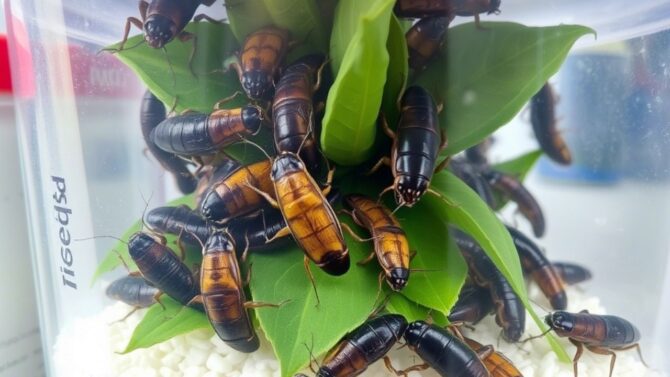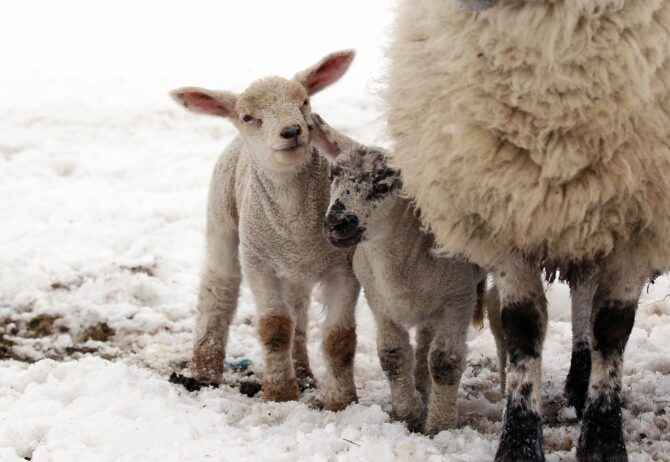As a guinea pig owner, you’re always on the lookout for tasty and nutritious treats to spoil your furry friend with. Fruits like blackberries are often a tempting choice, bursting with flavor and packed with vitamins. But the question arises: Can guinea pigs actually eat blackberries?
In this blog post, we’ll talk about the nutritional benefits and potential risks of feeding blackberries to your guinea pig. We’ll consult experts and scientific studies to provide you with a comprehensive answer so you can make an informed decision for your pet’s diet. Read on to find out!
Why Consider Blackberries for Your Guinea Pig?
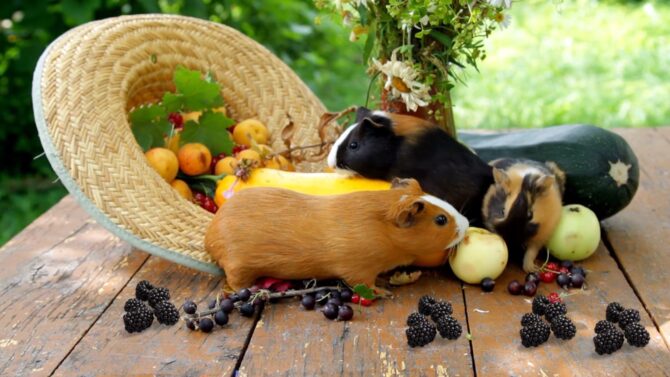
You’ve probably been there, strolling through the grocery store, passing the fruit section, and wondering, “Could my guinea pig enjoy these as much as I do?” It’s natural to want to share delicious treats with our pets, but it’s equally important to ensure that these treats are safe and healthy for them.
Nutritional Overview
The Good
Blackberries are packed with essential nutrients like:
- Vitamin C: Crucial for your guinea pig’s health.
- Fiber: Aids in digestion.
- Antioxidants: Help combat free radicals in the body.
The Not-so-Good
However, like all good things, blackberries have some downsides when it comes to guinea pig consumption:
- High Sugar Content: Too much sugar can lead to obesity and other health issues.
- Natural Acids: Excessive consumption can lead to mouth sores.
The Balanced Perspective
While blackberries are a healthy treat in moderation, it’s crucial to understand both their benefits and drawbacks. Always consult with a veterinarian for personalized advice, especially if your guinea pig has existing health issues.
Health Benefits for Guinea Pigs
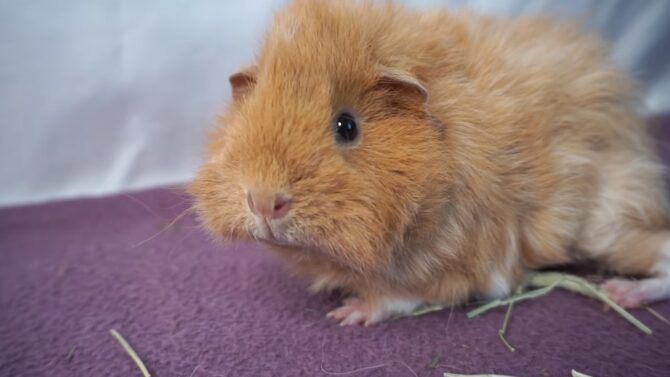
Vitamin C: A Must-Have Nutrient
Guinea pigs, like humans, can’t produce their own Vitamin C, making it an essential part of their diet. Vitamin C helps in the formation of collagen, improves the immune system, and prevents scurvy, a disease that can cause joint pain and lethargy in guinea pigs.
Antioxidants: Nature’s Shield
Blackberries are rich in antioxidants like vitamin C, vitamin A, and beta-carotene. Antioxidants are substances that can prevent or slow damage to cells caused by free radicals, unstable molecules that the body produces as a reaction to environmental and other pressures.
Dietary Fiber: For a Happy Tummy
Dietary fiber in blackberries aids in digestion, helping to maintain a healthy weight and prevent gastrointestinal issues. Proper digestion ensures that your guinea pig can efficiently absorb nutrients from their food, making them healthier and happier.
Potential Risks and Concerns
Sugar Content: The Sweet Dilemma
While blackberries are undeniably delicious, their high sugar content can be a concern. Excessive sugar can contribute to obesity, which in turn can cause other health issues like diabetes and heart disease. Moderation is key.
Pesticides and Chemicals: A Hidden Threat
Non-organic blackberries may be coated with pesticides and other chemicals. Even washing the fruit may not completely remove these chemicals, posing a potential risk to your guinea pig.
Final Thoughts on Risks
In summary, while blackberries offer numerous health benefits, they aren’t free from drawbacks. Pay attention to portion size and always opt for organic blackberries to minimize risks.
How to Introduce Blackberries to Your Guinea Pig’s Diet
Portion Size: Less is More
When introducing blackberries, start small. A single blackberry or even half, cut into bite-sized pieces, is a good initial portion. Observe your pet for any adverse reactions like diarrhea or lethargy.
Frequency: Not an Everyday Snack
Due to their sugar content, blackberries should only be an occasional treat. Feeding them once a week or even less frequently is a safe bet.
Tips for a Smooth Introduction
- Wash Thoroughly: Always wash the blackberries to remove any pesticides or chemicals.
- Start Small: Offer a small portion and monitor for any adverse effects.
- Mix with Other Foods: Initially, you can mix blackberries with foods your guinea pig is already familiar with.
Reader Testimonials: What Guinea Pig Owners Have to Say
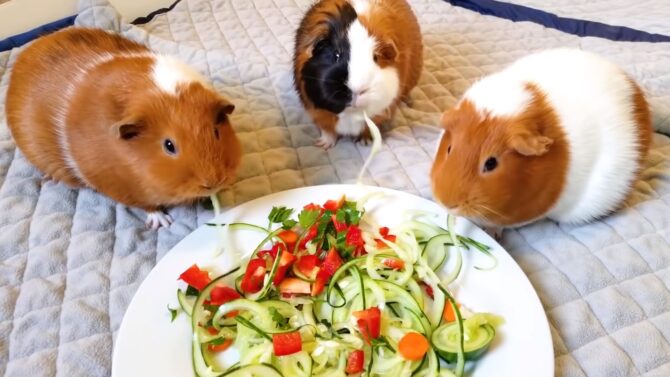
Real Stories, Real Pets
Nothing adds credibility to a topic like real-world experiences. Here’s what some guinea pig owners have to say about their experiences with feeding blackberries to their pets.
Lessons from Lisa: A Cautious Approach
Lisa, a guinea pig owner from Seattle, shared her cautionary tale. “I made the mistake of giving my guinea pig, Whiskers, too many blackberries when I first introduced them. He had diarrhea for a day. Lesson learned. Now, I follow the ‘less is more’ rule, and Whiskers is just fine!”
Tim’s Triumph: Success with Moderation
Tim from New York talks about the success he’s had with feeding blackberries to his guinea pig, Hazel. “I’ve been giving Hazel blackberries once a week for about six months, and she loves them! Plus, I noticed that her coat looks shinier, and she seems more active. The key is moderation and observation.”
Expert Tips for First-Timers
From these testimonials, the takeaway is clear: Start slow and always observe your pet’s reaction. While blackberries can offer numerous benefits, every guinea pig is unique. What works for one may not necessarily be ideal for another.
To-Do List: Your Next Steps for a Berry Happy Guinea Pig!
Ready to Take Action?
By now, you’re almost an expert on the topic of guinea pigs and blackberries. But knowledge is only power when you apply it. Here’s a simple to-do list to get you started:
- Consult Your Vet: Always the first step when introducing something new into your pet’s diet.
- Buy Organic: Opt for organic blackberries to minimize pesticide risks.
- Wash & Prepare: Rinse the berries well and cut them into manageable sizes.
- Start Small: Introduce a small portion and observe your guinea pig for any signs of discomfort.
- Record: Keep a feeding diary to monitor any changes or reactions.
Your Reward Awaits
Imagine the joy and contentment you’ll feel when you see your guinea pig happily munching on a nutritious treat that you’ve confidently provided. That alone makes all this effort worthwhile, doesn’t it?
Every Step Counts
Whether you’ve just adopted a guinea pig or you’ve been a long-time owner, every step you take toward your pet’s well-being counts. From diet to habitat, every choice matters.
FAQs
How often can I feed blackberries to my guinea pig?
It is recommended to feed a small blackberry to your guinea pig twice a week. Feeding them more frequently could lead to health issues due to the high sugar content in blackberries.
Can guinea pigs eat the seeds and skin of blackberries?
Yes, guinea pigs can eat the entire blackberry, including the seeds and skin.
What are the risks of feeding blackberries to guinea pigs?
Feeding them in excess can lead to digestive issues, diabetes, and dental health problems due to the high sugar content.
What are the symptoms of digestive issues in guinea pigs from eating too many blackberries?
Symptoms may include an upset stomach and diarrhea.
Can guinea pigs get diabetes from eating too many blackberries?
Yes, they are susceptible to diabetes if they consume a sugar-rich diet, which includes eating too many blackberries.
How do blackberries affect a guinea pig’s dental health?
A diet rich in sugar can cause dental issues like cavities and gum disease in guinea pigs.
Can blackberries replace the regular diet of guinea pigs?
No, they should only be an occasional treat and not a replacement for a balanced diet.
Final Words
You are now well-equipped to make the best dietary choices for your guinea pig when it comes to the juicy, delicious world of blackberries. If you have any further questions or concerns, don’t hesitate to reach out. Many vets offer dietary consultations specifically for small pets like guinea pigs, and online forums are a great place to connect with other guinea pig enthusiasts.

